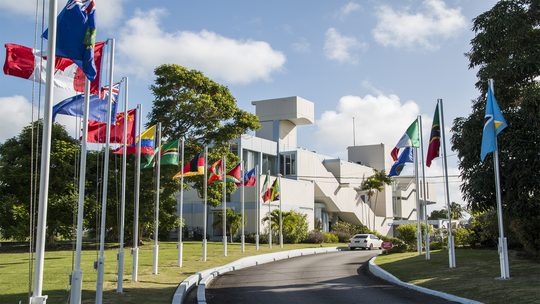It has been thirteen years since The Caribbean Development Bank (CDB) held its last development banking conference.
 Since then, much has changed including the effects of the financial economic crisis of 2008, the continuing effects of climate change on small island developing states as well as the emergence of trade tensions that threaten global economic stability. It is against this backdrop that the CDB is hosting its Development Banking Conference in partnership with the Saint Lucia Development Bank.
Since then, much has changed including the effects of the financial economic crisis of 2008, the continuing effects of climate change on small island developing states as well as the emergence of trade tensions that threaten global economic stability. It is against this backdrop that the CDB is hosting its Development Banking Conference in partnership with the Saint Lucia Development Bank.
Director of Projects Department at the Caribbean Development Bank, Daniel Best, says the conference is critical and timely as the bank embarks on the preparation of its strategic plan for 2020-2024. “Since the 1960’s development banks have been a longstanding feature of the financial landscape of CDB’s borrowing member countries, having been established by governments largely to respond to market failure and the unwillingness of by commercial banks, mostly foreign owned, to lend in areas that were perceived to be high risk. This response to market failure justified the allocation of limited resources by governments through national development banks also referred to as development financing institutions (DFIs). DFIs are strategically put in place to promote economic development within respective member countries, consistent with CDB’s mandate for reducing poverty and supporting inclusive and sustainable growth and development,” Best unveils.
The Government of Saint Lucia recognizes the key role that development financing plays in the socio-economic development of the Caribbean region. Permanent Secretary in the Ministry of Economic Development, Housing, Urban Renewal, Transport and Civil Aviation, Claudius Emmanuel says the CDB in collaboration with other development financing institutions can play a lead role in helping to unlock a significant amount of funds available in climate change for example. “Given its history and institutional human resource experience, CDB in conjunction with other DFIs and other regional bankers play a critical role in helping borrowing member countries wade through the maze of requirements often put on by the custodial of those funds. Currently the Green Climate Fund, for example, manages a portfolio of around US$5 billion. In fact, they are poised for another replenishment in the coming months. Clearly our small island states need to be able to access those resources effectively and efficiently as possible,” Emmanuel says.
In the case of the Organization of Eastern Caribbean States, OECS Director General Dr. Didacus Jules says development banking plays a critical role in regional integration. He says the regional integration effort cannot succeed if it is not embraced by the private sector. Access to development finance on encouraging terms is essential to this engagement.
“It is essential that Caribbean development be propelled by Caribbean people. While Foreign Direct Investment has an important and catalytic role to play in our economic development, we cannot neglect the strategic importance of developing a culture of ownership in our region. The liquidity of the commercial banking sector-which by the way is not foreign capital but our own domestic savings- and the liquidity of the credit unions represent a powerful resource for self -development and ownership that can incorporate ordinary citizens,” The OECS Director General asserts.
The conference is being held under the theme, ‘Development Banking in the Caribbean: A regional approach to sustainable Development’.